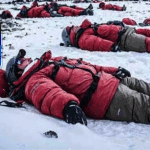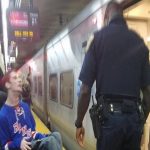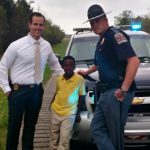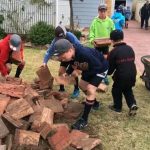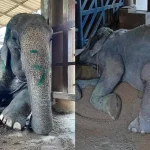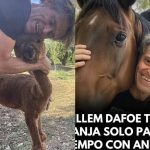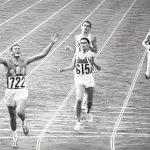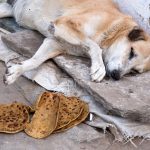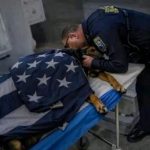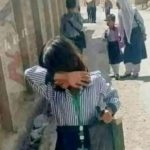“I chose to stay — and now I live with the weight of that choice”: a father’s account of survival and loss

The last sound he remembers is the ordinary music of home: his children playing. Then everything went dark.
When he woke, the house was a ruin and his world had narrowed to a few immediate, terrible facts. He could not see well, he could not hear clearly. He found his wife badly injured—broken back and legs—but alive. Using his phone as a flashlight, he crawled through rubble calling for their children. A small voice answered: “Baba, Baba, where are you?” He lifted his three-year-old daughter, Julia, into his arms and carried her to safety. Then he went back for his son, Kareem, who had suffered severe head trauma and was wandering in a daze, whispering a child’s apology: “I’m sorry, Mama. Please don’t blame me.”

What followed was a blur of hospital lights and frantic care. He did not let the doctors handle everything alone. Where he could, he became both parent and nurse: changing dressings, removing sutures, lending his hands to the medical tasks that might restore their bodies—and, he hoped, some measure of their dignity. In those moments he clung to an identity that made sense: father, protector, hero. Even now, as they survive day to day, he keeps that role alive for his children.
But survival has a new shape. His wife is confined to a wheelchair; her mobility and independence taken from her. The children’s physical wounds are slowly mending, but the blows to their brains have left subtler, crueler scars. Kareem’s head injury impairs memory and focus. Julia wakes at night screaming; the sound of rockets still sends her into tremors. She used to accept the reassurances adults offer in Gaza—the practiced lie: “Don’t worry, they’re not aiming at us.” Now she no longer believes it.
He forces himself to be strong because he knows the children look to him for safety. “They still need their father to be their hero,” he says. But he admits—plainly, painfully—that he is not strong. He is exhausted, barely eating, wearing old clothes, with a body and spirit frayed by sleepless nights and constant care. He is terrified that another strike could undo whatever fragile recovery they’ve made. He feels broken.
And then there is the weight of choice.
A year earlier he had a chance to leave. He stayed because of love—love for his patients, love for his people. He is a doctor, committed to serving in a place where help is scarce and the need is dire. He believed his presence mattered. Now he lives with the unbearable question: by remaining, did he put his family in harm’s way? “My children deserved a different life than this,” he says. “I failed to keep them safe.”
That regret is complicated. It sits alongside the reality of duty—the knowledge that in the moments after the strike, his skills and his presence likely saved other lives. It sits alongside the heartbreak of watching the person you love in pain, and the small, exhausted triumphs of children who learn, slowly and with great effort, to eat and speak again. There is no single answer that eases the anguish; only the ongoing work of care and the daily grind of patching what can be patched.

Their life now is a series of small battles. Julia’s nights are long and filled with nightmares. Kareem struggles to form words and to hold a fork with the same certainty he once did. His wife’s injuries mean he is not simply a father; he is the family’s primary caregiver, responsible for dressing wounds, cooking, bathing, transporting, and answering the questions children ask that he has no good answers for. The home that once held play and laughter is now organized around therapy appointments, hospital checkups, and the constant fear of what might come next.
Still, there are glimmers of something persistent: survival, stubborn and human. When Julia manages a quiet laugh, he holds it like treasure. When Kareem repeats a word that was lost to him, the small victory becomes a lighthouse in their days. The work is slow, and sometimes the progress feels almost cruelly minute, but it exists. For every moment of despair, there is an almost reflexive insistence to try again, to keep going.
His story is an intimate portrait of how war reshapes ordinary lives. It shows how decisions made from love and duty can carry devastating consequences, and how people try to live with those consequences in real time. It is also a plea—unspoken but clear—for understanding rather than judgment. Choices in conflict are rarely black and white; they are made in the gray, under pressure, with partial information and with hearts that want to do right both by family and by community.

“I chose to stay because I love my people and my patients,” he says, voice quiet. “Now I live with the weight of that choice.” He does not ask for absolution. He asks, perhaps only for the world to see the reality he lives in: the nights of watchful fear, the hands that cradle wounds instead of toys, the father who will keep trying to be a hero even when he feels far from it.
This is an account of survival—and of loss. It is a reminder that alongside the headlines are households where the ordinary tasks of parenting become acts of extraordinary courage. And above all, it is a human story: a family learning, painfully and slowly, how to be together again in a world that has been forever altered.
